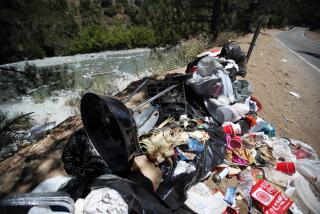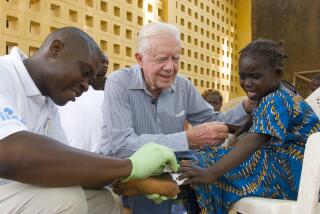BARRY COMMONER : He’s Still ‘a Generic Optimist’
- Share via
Barry Commoner has long been called the “Paul Revere of ecology,” but the description isn’t really accurate because Paul Revere’s message was taken seriously by his listeners.
Commoner, on the other hand, was warning about throwaway bottles, detergents and pesticides 20 years ago and he would hardly have to change a word of those lectures for an audience today.
This seeming lack of progress might discourage most activists, but the Brooklyn-born Commoner, at 72, describes himself as a “generic optimist.” “If you are patient, people will listen to you eventually,” he explains. “People will say, ‘Oh, that’s what he was talking about.’ ”
Since the 1960s, Commoner’s Center for the Biology of Natural Systems, now located at Queens College, has been tackling environmental issues. “We are looking at solutions,” emphasizes Commoner. “We did the first study 15 years ago comparing organic and conventional farms. We did a study on the feasibility of solar fuel. . . . We have shown it’s possible to recycle up to 84.4% of household trash into the current market.
“In other words, we have been doing this for a long time and I know there are economically sound and economically better solutions to most of our problems.”
Commoner’s environmentalism was born in the 1950s when he and a group of fellow scientists, studying the effects of nuclear testing, found that radioactive fallout was affecting the food chain. The scientists were given much of the credit for the 1963 U.S.-Soviet ban of above-ground nuclear testing.
As a founder of the original Earth Day in 1970 who deplores the lack of progress since (“We haven’t been getting at the root causes of pollution and toxic hazards”), he insists that we have the ability to clean up the planet. Acknowledging the enormousness ity of the challenge, he approaches it with a blunt practicality, spelled out in his upcoming book, “Making Peace With the Planet.”
In it Commoner argues that the technology of production, or technosphere, is a human creation that has been repeatedly designed and redesigned since the Stone Age. In the 40 years since World War II, motivated by short-term profit maximization, we have designed an energy-gulping, heavy-polluting production system--but we aren’t stuck with it. “If we designed a system that created the damage, we can design a system that will undo the damage,” he declares.
His book offers an agenda for such a massive redesign, including organic farming, lighter automobiles, expanded mass transit, limiting plastics to where they are really needed, and recycling.
Commoner believes that “the technological basis for the transformation of the present systems of production to ecologically sound ones is largely in hand.”
NOTABLE
Recipient of 12 honorary degrees and numerous awards, including International Humanist Award; author of five books on ecology and energy production, including “The Closing Circle” which won the 1971 Phi Beta Kappa award.
NAME: BARRY COMMONER
TITLES: Biologist, environmentalist, educator. Director, Center for the Biology of Natural Systems, Queens College.
QUOTE: “We designed the system we have now and we can redesign it. It doesn’t mean going back to the horse and buggy, but changing the kind of technologies we are using.”
More to Read
Sign up for our Book Club newsletter
Get the latest news, events and more from the Los Angeles Times Book Club, and help us get L.A. reading and talking.
You may occasionally receive promotional content from the Los Angeles Times.







